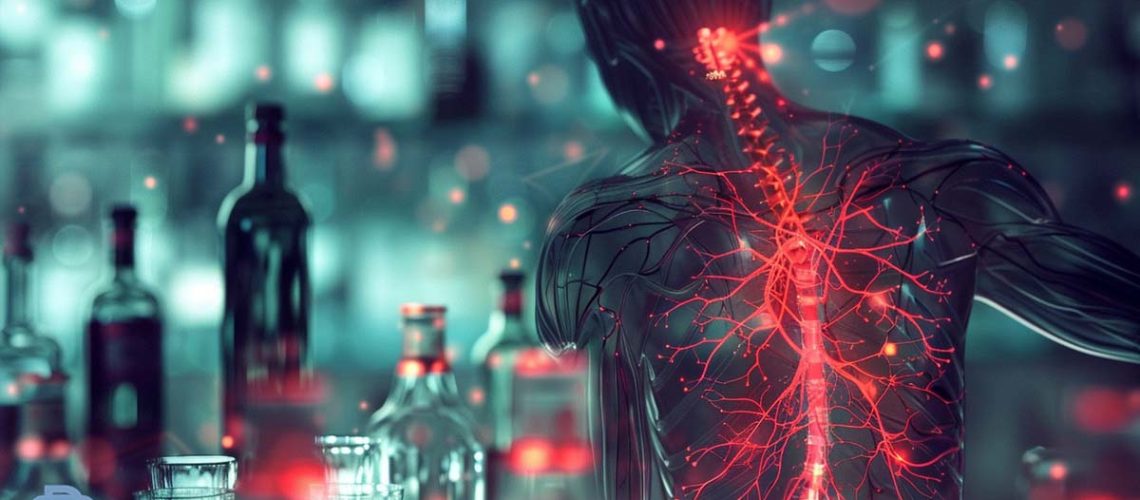The Silent Toll: Unveiling the Truths of Alcoholic Neuropathy
For many, alcohol is a social lubricant, a way to unwind. But what if the cheers mask a hidden danger? Alcoholic Neuropathy is a condition where prolonged excessive alcohol consumption damages the peripheral nerves, leading to a gradual erosion of sensation and function.
This silent thief often goes unnoticed until the damage is done, manifesting as numbness, tingling, burning, or weakness, especially in the feet and legs. But the impact goes beyond physical discomfort. It can affect balance, coordination, and even daily activities, leading to a significant decline in quality of life.
The good news? Early intervention is key. By understanding the underlying causes, symptoms, and treatment options for alcoholic neuropathy, we can empower individuals to make informed choices about their health.
Join us as we shed light on this often-overlooked condition, arming you with the knowledge to protect yourself and those you care about from its silent toll.
What is Alcoholic neuropathy
Alcoholic neuropathy, a condition resulting from chronicA condition of slow progression that continues over a long period of time, opposite of acute. alcohol abuse, leads to nerve damage in the peripheral nervous system. This damage can manifest as symptoms such as pain, numbness, tingling, and muscle weakness in the extremities. One of the key factors contributing to alcoholic neuropathy is thiamine deficiency, often observed in individuals with chronic alcohol use disorder. The effects of this condition can be debilitating, affecting one’s quality of life and mobility.
Chronic alcohol consumption can disrupt nerve conduction velocities, further exacerbating the nerve damage seen in alcoholic neuropathy. It’s alarming to note that up to 66% of chronic alcohol users may develop some form of neuropathy due to their alcohol intake. However, there’s hope for those suffering from this condition. Seeking early medical attention and abstaining from alcohol can significantly improve the prognosis and minimize complications associated with alcoholic neuropathy. It’s crucial to address this condition promptly to prevent further deterioration of nerve function.
Causes
Excessive alcohol consumption damages nerves directly, contributing significantly to the development of neuropathy caused by alcohol abuse. Alcoholic neuropathy is a complex condition with various causes involving nerve damage, vitamin deficiencies, alcohol-related liver disease, direct toxic effects, and metabolic changes induced by chronic alcohol consumption.
- Involvement of Nerve Damage: Chronic alcohol consumption leads to nerve damage, which is a central factor in the development of alcoholic neuropathy.
- Role of Vitamin Deficiencies: Alcohol abuse often results in vitamin deficiencies, such as B vitamins, which are crucial for nerve health and function, contributing to the pathogenesis of alcoholic neuropathy.
- Impact of Alcohol-Related Liver Disease: Alcohol-related liver disease can impair nerve health and function, exacerbating the symptoms of alcoholic neuropathy.
These factors collectively play a significant role in the development and progression of alcoholic neuropathy, highlighting the importance of addressing the root causes to manage and potentially prevent this condition.
Symptoms of Symptoms
Symptoms of alcoholic neuropathy commonly manifest as numbness, tingling, and burning pain in the arms and legs. This condition can also bring about a variety of other symptoms that affect both sensory and motor functions. Here are some additional symptoms you might experience:
- Abnormal sensations: Alcoholic neuropathy may lead to feelings of pins and needles, tingling, or hypersensitivity to touch (hyperalgesia).
- Muscle problems: Weakness, cramps, aches, or spasms in the muscles are common manifestations of alcoholic neuropathy.
- Heat intolerance: Individuals with alcoholic neuropathy often struggle with heat intolerance, especially after physical activity.
These symptoms can significantly impact your quality of life, making everyday tasks challenging. If you’re experiencing any of these symptoms, it’s crucial to seek medical attention promptly to receive an accurate diagnosis and appropriate treatment.
Exams and Tests
To assess alcoholic neuropathy, healthcare providers conduct a physical examination and inquire in detail about symptoms. This evaluation is crucial for diagnosing and understanding the extent of nerve damage caused by alcohol consumption. Here are some common exams and tests used in the assessment of alcoholic neuropathy:
- Eye Exams: Eye exams can reveal specific eye issues related to alcoholic neuropathy, providing valuable insights into the condition’s impact on the optic nerves and visual function.
- Blood Tests: Blood tests play a significant role in diagnosing alcoholic neuropathy by identifying nutrient deficiencies such as thiamine and folic acid, which are common in individuals with this condition.
- Imaging Tests, Nerve Conduction Studies, and Nerve Biopsies: In addition to blood tests and eye exams, imaging tests like MRI can help assess nerve damage. Nerve conduction studies and, in severe cases, nerve biopsies may also be used to aid in the diagnosis of alcoholic neuropathy, providing a comprehensive picture of the nerve damage present.
Treatment
When addressing alcoholic neuropathy, the primary focus shifts to implementing treatment methods aimed at preventing further nerve damage and managing existing symptoms. The cornerstone of treating alcoholic neuropathy involves immediate abstinence from alcohol to halt the progression of nerve damage.
Additionally, vitamin supplementation, particularly with thiamine and folic acid, is crucial for managing the condition. Pain management plays a significant role in alleviating symptoms like burning pain and hyperalgesia, often requiring prescribed medications.
Physical therapyTreatment approaches like therapeutic exercises, hot/cold therapies and manual joint manipulation to improve mobility and reduce muscul... More and the use of orthopedic appliances may be recommended to enhance muscle strength and coordination, improving overall mobility. In more severe cases where alcohol use disorder is a concern, inpatient detox or outpatient rehab programs may be necessary to address both the addictionCompulsive drug use despite negative consequences indicating impaired control over usage. Differs from dependence. and the neuropathy symptoms effectively.
Prognosis Based on Symptoms
Understanding the prognosis of alcoholic neuropathy hinges on recognizing how the severity of symptoms and the duration of alcohol abuse impact the overall outlook. In alcoholic neuropathy, the progression of nerve damage is closely linked to the continuation of alcohol consumption. Symptoms like numbness, tingling, and muscle weakness may worsen over time with ongoing alcohol abuse. Early diagnosis and intervention play crucial roles in slowing down the advancement of nerve damage. Chronic painChronic Pain is an ongoing or long-term pain that persists for 12 weeks or longer, typically caused by an underlying disease, disorder,... More, loss of coordination, and disability can arise as potential complications affecting the prognosis of alcoholic neuropathy.
Recovery outcomes are influenced by adherence to treatment plans that include alcohol cessation and maintaining proper nutrient balance. By addressing alcohol abuse promptly and seeking medical help, individuals with alcoholic neuropathy can improve their prognosis and potentially prevent further deterioration. It’s essential to understand that the prognosis of alcoholic neuropathy is intricately tied to symptom severity, duration of alcohol abuse, and the timeliness of intervention.
When Should I Contact Professional Doctor?
If experiencing numbness, tingling, or pain in your arms or legs from chronic alcohol consumption, it’s crucial to contact a professional doctor promptly. Chronic alcohol consumption can lead to alcoholic neuropathy, causing symptoms like muscle weakness, cramps, and coordination difficulties. If you notice these signs, seeking medical help is essential.
Moreover, developing heat intolerance, especially after physical activity, could indicate nerve damage from alcohol abuse, necessitating a healthcare provider’s evaluation. Additionally, if an eye exam reveals alcohol-related vision problems, scheduling an appointment with a doctor is advised for further assessment and guidance.
Early intervention is key in addressing alcoholic neuropathy effectively, as it can help prevent further nerve damage and improve treatment outcomes. Therefore, don’t hesitate to reach out to a medical professional when experiencing these symptoms to receive proper care and management for alcoholic neuropathy.
How Can Alcoholic neuropathy Be Prevented If Treatment Begins In Time?
To prevent alcoholic neuropathy effectively when treatment begins in time, abstaining from alcohol is crucial to halt further nerve damage. Alcohol is a major contributor to nerve damage, so avoiding its consumption is the first step in preventing progression of the condition.
Alongside abstinence, focusing on proper nutrition and considering vitamin supplementation can help reverse nutrient deficiencies that exacerbate neuropathy symptoms. Adequate levels of essential vitamins, especially B vitamins, can support nerve health and aid in recovery.
Regular medical check-ups and monitoring are essential to identify any complications early on and adjust the treatment plan accordingly. Education about the long-term consequences of alcohol abuse is vital in preventing relapse and further nerve damage.
Seeking support from healthcare professionals, attending support groups, and involving loved ones in the recovery process can also contribute to successful prevention and management of alcoholic neuropathy. By taking these steps, you can improve your chances of preventing alcoholic neuropathy and promoting nerve health.
Conclusion
Overall, alcoholic neuropathy is a serious condition that can result from prolonged alcohol abuse, causing damage to the nerves in the peripheral nervous system.
It’s important to address nutritional deficiencies, abstain from alcohol, and manage symptoms to improve outcomes.
Seeking medical attention and starting treatment early can help prevent further nerve damage and improve quality of life.
Remember, taking proactive steps can make a significant difference in managing alcoholic neuropathy.

